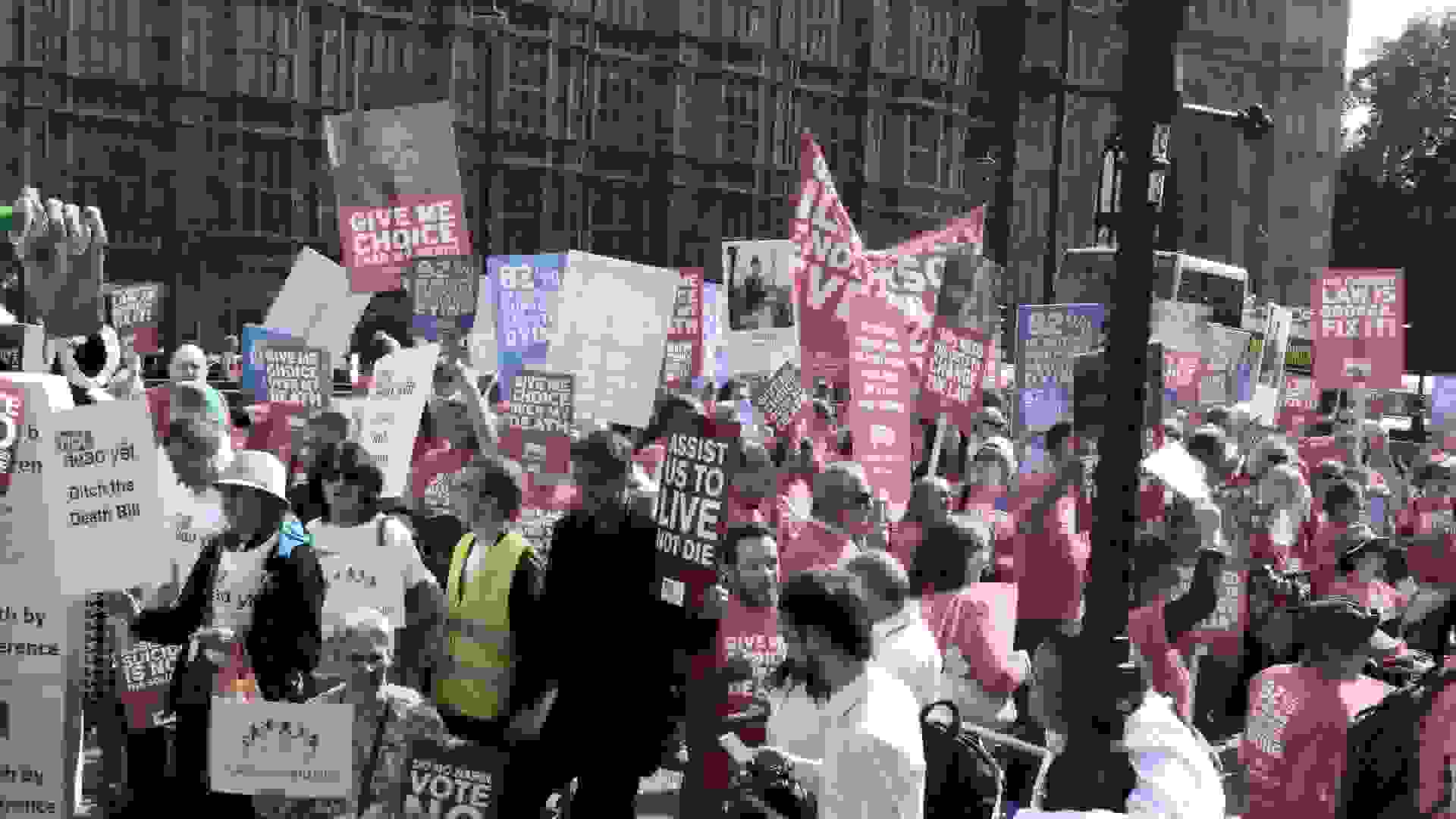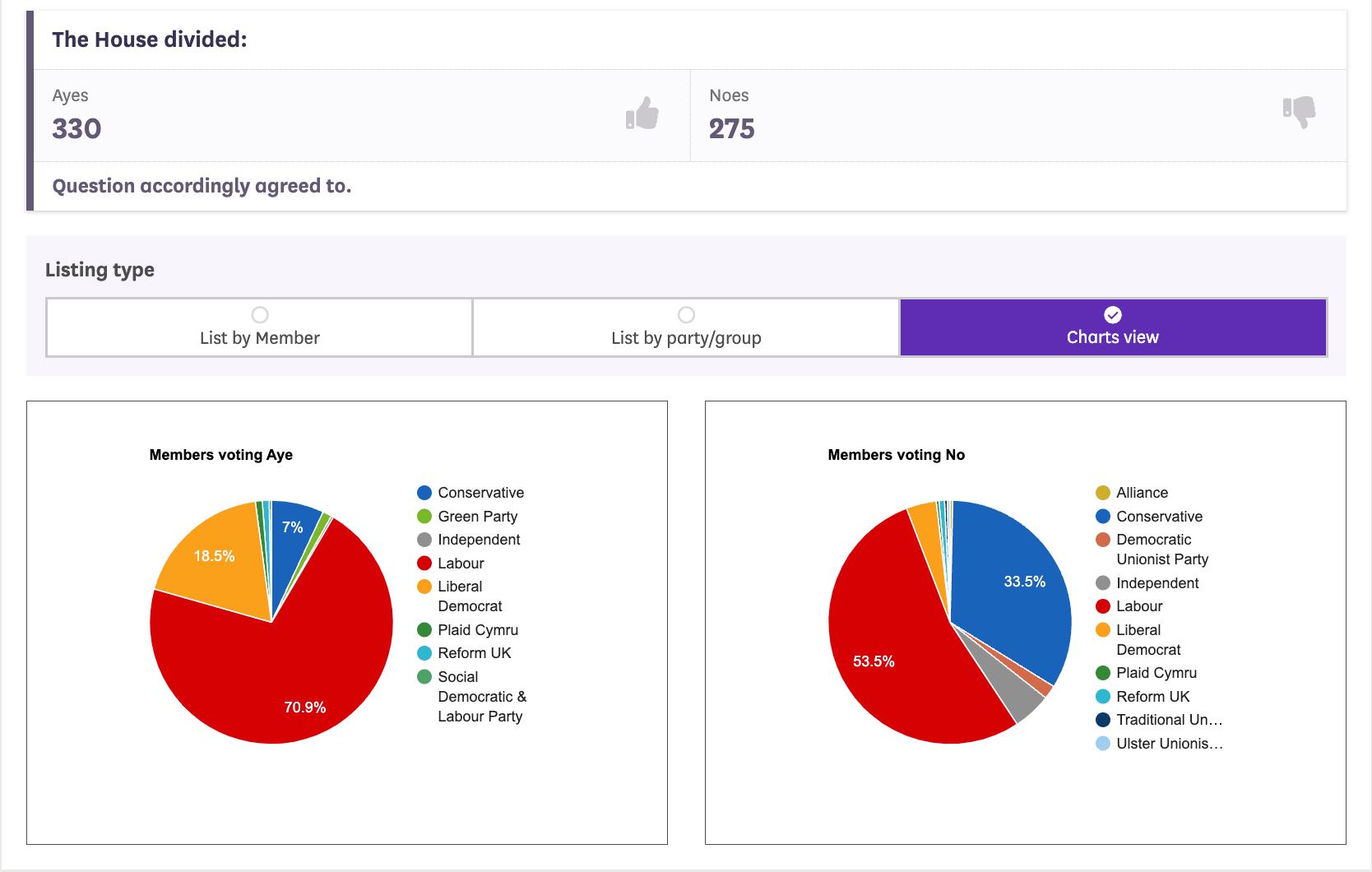| Clause 1 | | | |
| 1 | 178 [Leadbeater] + 179 [Leadbeater] + 180 [Leadbeater] + 182 [Leadbeater] + 193 [Leadbeater] | Extraterritorial application | These amendments would clarify that only persons in England and Wales can access assisted dying and only doctors in England and Wales can perform the functions under the Bill. |
| 2 | 34 [Olney] + 36 [Olney] + 37 [Olney] + 38 [Olney] + 202 [Leadbeater] + 39 [Olney] + 40 [Olney] + 41 [Olney] + 42 [Olney] + 43 [Olney] + 44 [Olney] + NC1 [Olney] + 45 [Olney] + 46 [Olney] + 47 [Olney] | Mental capacity and ability | Olney's amendments would replace the concept of capacity to make a decision - as provided for in the Mental Capacity Act 2005 - with the concept of ability to make a decision. The amendment from Kim Leadbeater seeks to correct a typographical error. |
| 3 | 353 [Kruger] + 354 [Kruger] + 355 [Kruger] + 356 [Kruger] + 357 [Kruger] + 358 [Kruger] | Categories of persons eligible for assisted dying | Kruger's amendments seek to exclude homeless persons and prisoners from eligibility. |
| 4 | 109 [J Campbell] + 110 [J Campbell] + 111 [J Campbell] + 112 [J Campbell] | Patient's intentions | These amendments would change the requirement for the patient to have an 'informed' wish to end their life to a 'demonstrably informed' wish. |
| 5 | 23 [Bool] + 82 [Paul] + 113 [J Campbell] + 24 [Bool] + 83 [Paul] + 114 [J Campbell] + 25 [Bool] + 84 [Paul] + 115 [J Campbell] + 26 [Bool] + 85 [Paul] + 27 [Bool] + 86 [Paul] + 28 [Bool] + 87 [Paul] + NC5 [Paul] + 29 [Bool] + 88 [Paul] + 118 [J Campbell] + 30 [Bool] + 89 [Paul] + 119 [J Campbell] + 31 [Bool] + 90 [Paul] + 120 [J Campbell] + 32 [Bool] + 91 [Paul] + 121 [J Campbell] + 33 [Bool] + 92 [Paul] + 122 [J Campbell] | Coercion and pressure | These amendments seek to strengthen the requirement that a patient not be coerced to also cover undue influence, encouragement and manipulation. |
| 6 | 94 [Cleverly] + 235 [C Johnson] + 95 [Cleverly] + 236 [C Johnson] + 96 [Cleverly] + 237 [C Johnson] + 97 [Cleverly] + 238 [C Johnson] + 98 [Cleverly] + 239 [C Johnson] + 99 [Cleverly] + 240 [C Johnson] + 100 [Cleverly] + 241 [C Johnson] + 101 [Cleverly] + 242 [C Johnson] + 102 [Cleverly] + 243 [C Johnson] + 103 [Cleverly] + 244 [C Johnson] + 104 [Cleverly] + 245 [C Johnson] | Patient's motivations | Cleverly's amendments require the patient to be acting for their own sake and not for the benefit of others. Johnson's amendments require the patient's primary motivation to be avoiding physical pain. |
| 7 | 281 [Maskell] + 299 [Maskell] + 298 [Maskell] | Palliative care | These amendments would add a requirement for the patient to have met first with a palliative care specialist to discuss the palliative care options available to them. |
| 8 | Clause stand part | Clause stand part | A separate debate on whether the clause should be included in the Bill. |
| Clause 2 | | | |
| 9 | 123 [J Campbell] + 9 [Bool] + 48 [Shah] + 282 [Maskell] + 51 [B Spencer] + 234 [Gordon] + 10 [Bool] | Definition of terminal illness | Campbell's amendment requires the illness to be 'inevitably progressive' rather than 'typically progressive'. Bool's amendments would add that illnesses that can be managed or treated are not terminal. Shah's amendments would change the requirement that death be reasonably expected within six months to a requirement that death be expected with reasonable certainty within six months even with all recommended treatment options. |
| 10 | 246 [Hazelgrove] + 247 [Hazelgrove] + 11 [Bool] + 181 [Leadbeater] + 283 [Maskell] | Physical and mental illness | Kim Leadbeater's amendment clarifies that a person cannot be considered terminally ill if they have only a mental illness or disability or both. The other amendments seek to make the exclusion of mental illness more explicit. |
| 11 | 12 [Bool] + 13 [Bool] | List of terminal illnesses | These amendments would require the terminal illnesses that qualify a person for assisted dying be explicitly listed in regulations. |
| 12 | Clause stand part | Clause stand part. | A separate debate on whether the clause should be included in the Bill. |
| Clause 3 | | | |
| 13 | 322 [Francis] + 49 [B Spencer] + 50 [B Spencer] + 318 [Paul] + Clause 3 stand part | Assessing capacity | These amendments seek to: reverse the presumption that a patient has capacity; apply the balance of probabilities to the assessment of capacity; and require capacity to be established beyond reasonable doubt. |
| Clause 4 | | | |
| 14 | 8 [Webb] + 124 [J Campbell] + 278 [Munt] + 319 [Francis] + 339 [Francis] + 320 [Francis] + 270 [Murrison] + 276 [Shah] + 277 [Shah] + NC6 [Shastri-Hurst] | Restricting discussion of assisted dying | Some of these amendments seek to prohibit doctors from raising assisted dying with patients. Others require a time limit between a prognosis being given and a preliminary assessment or would impose a lengthier timetable if a patient has a learning difficulty. |
| 15 | 342 [A Dixon] + 285 [Maskell] + 343 [A Dixon] + 344 [A Dixon] + 275 [L Atkinson] + 108 [Billington] + 183 [Leadbeater] + 53 [B Spencer] + 54 [B Spencer] + 286 [Maskell] | Content of preliminary discussion | Kim Leadbeater's amendment seeks to clarify that the preliminary discussion cannot take place in isolation from a discussion of the patient's prognosis and available palliative care or treatment. Others require the discussion to take place in consultation with specialists in palliative care or terminal illness; to cover the uncertainties around a prognosis; and to require the discussion to cover "all appropriate" rather than "any available" palliative care. |
| 16 | 71 [B Spencer] + 72 [B Spencer] + 73 [B Spencer] + 75 [B Spencer] + 74 [B Spencer] + 76 [B Spencer] + 81 [B Spencer] + 77 [B Spencer] + 78 [B Spencer] + 79 [B Spencer] + 80 [B Spencer] + NC4 [B Spencer] | Assisted Dying Agency | These amendments would establish an Assisted Dying Agency which would organise the process, including by assigning doctors to patients. |
| 17 | 345 [A Dixon] + 288 [Maskell] + 297 [Maskell] + 295 [Maskell] + 300 [Maskell] + 302 [Maskell] | Records and transcripts | These amendments would strengthen the record keeping by requiring full written transcripts of consultations and efforts to dissuade a patient from undertaking an assisted death to be recorded and added to a patient's medical record. |
| 18 | 341 [C Johnson] + 338 [Francis] + 287 [Maskell] + NC13 [Francis] | Referral to other doctors | These amendments cover requirements to refer a patient to other doctors, or to make them aware of other doctors, if a doctor is unwilling to have a preliminary discussion. |
| 19 | 125 [J Campbell] + 126 [J Campbell] + NC7 [J Campbell] | Doctors willing to participate | These amendments would establish a Register of Assisted Dying Medical Practitioners, which records any doctors willing to participate in the process. |
| 20 | Clause stand part | Clause stand part | A separate debate on whether the clause should be included in the Bill. |
| Clause 5 | | | |
| 21 | 271 [Murrison] + 272 [Murrison] | Role of psychiatrists | These amendments would require a 'psychosocial intervention' to take place if a patient has been diagnosed with their terminal illness within the last six months. |
| 22 | 323 [Malthouse] + 184 [Leadbeater] + 289 [Maskell] + 324 [Malthouse] | First declaration | Kim Leadbeater's amendment would enable the first declaration form to be determined through regulations rather than as a schedule to the Bill. Malthouse's amendment would impose requirements on the content of the first declaration form. |
| 23 | 290 [Maskell] + 185 [Leadbeater] + 335 [Francis] + 52 [B Spencer] + 186 [Leadbeater] + Amendment (a) to Amendment 186 [Francis] + 340 [Francis] + 20 [Asato] + 336 [Francis] + 337 [Francis] + NC12 [Francis] | Training requirements for first assessing doctor | Kim Leadbeater's amendments would require Ministers to make regulations for enhanced training of doctors involved in the process, including on capacity and coercion. Other amendments require doctors to be trained on domestic and financial abuse and on dealing with autism and learning difficulties, as well as allowing doctors to opt out of training related to assisted dying. |
| 24 | 187 [Leadbeater] +188 [Leadbeater] + 192 [Leadbeater] + 199 [Leadbeater] + 200 [Leadbeater] + 206 [Leadbeater] + 211 [Leadbeater] + 212 [Leadbeater] + 213 [Leadbeater] + 215 [Leadbeater] + 216 [Leadbeater] + 217 [Leadbeater] + 218 [Leadbeater] + 219 [Leadbeater] + 222 [Leadbeater+ 225 [Leadbeater] + 226 [Leadbeater] + 233 [Leadbeater] + NC8 [Leadbeater] | Delegated powers | Kim Leadbeater's amendments would move the provisions relating to delegated powers into a consolidated clause towards the end of the Bill, and would require the Government to consult before using certain specified powers. |
| 25 | 144 [Saville Roberts] + 145 [Saville Roberts] + 146 [Saville Roberts] + 147 [Saville Roberts] + 148 [Saville Roberts] + 149 [Saville Roberts] + 150 [Saville Roberts] + 151 [Saville Roberts] + 152 [Saville Roberts] + 153 [Saville Roberts] + 154 [Saville Roberts] + 155 [Saville Roberts] + 156 [Saville Roberts] + 157 [Saville Roberts] + 158 [Saville Roberts] + 159 [Saville Roberts] + 160 [Saville Roberts] + 161 [Saville Roberts] + 162 [Saville Roberts] + 163 [Saville Roberts] + 164 [Saville Roberts] + 165 [Saville Roberts] + 166 [Saville Roberts] + 167 [Saville Roberts] + 168 [Saville Roberts] + 169 [Saville Roberts] + 170 [Saville Roberts] + 171 [Saville Roberts] | Devolved competence | These amendments would allow Welsh Ministers to exercise the powers delegated to UK Ministers in the Bill. |
| 26 | 359 [Kruger] + 360 [Kruger] + 361 [Kruger] | Coordinating doctor: additional provisions | These amendments would require the first assessing doctor to have conducted the preliminary discussion before allowing a patient to sign a first declaration and would require doctors to declare in an annual statement that they are remunerated for the provision of assisted dying. |
| 27 | Clause stand part | Clause stand part | A separate debate on whether the clause should be included in the Bill. |
| Clause 6 | | | |
| 28 | 189 [Leadbeater] + 190 [Leadbeater] + 291 [Maskell] + 292 [Maskell] + 191 [Leadbeater] + 293 [Maskell] | First declaration | Kim Leadbeater's amendments would clarify elements of the requirements to produce ID, and to be witnessed, when signing a first declaration. Others would make provision about specifying the acceptable forms of photo ID. |
| 29 | Clause stand part | Clause stand part | A separate debate on whether the clause should be included in the Bill. |








